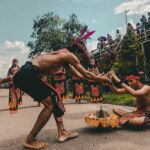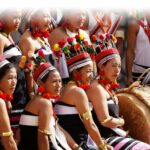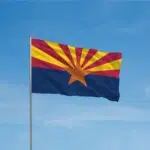We observe Lui-Ngai-Ni Festival on February 14 and 15 to celebrate the centuries-old ritual of sowing new seeds, and to kick-start a new year of harvest. February brings the promise of spring, sunshine, and the celebration of a new life. The two days of observation of the grand harvest festival are filled with cultural dances, songs, costumes, and rituals of historic importance. Leaders of the Naga tribe, based in the North East region of India, organize Lui-Ngai-Ni and bring together 40 tribes to invoke the god of crops, as they pray for a fruitful harvest season.
History of Lui-Ngai-Ni Festival
Lui-Ngai-Ni is one of the most popular festivals of the Naga tribe. Spread through the entire North East region of India and eastern districts of Myanmar, the Nagas are a collection of 40 minor tribes and ethnic groups known for their immensely rich culture and linguistic diversity.
After years of dispersion, the Naga people came together in the late 1980s and an evaluation of customs and traditions was proposed within the tribe. The modernization of the centuries-old harvest festival was also undertaken, which gave birth to Lui-Ngai-Ni. The word ‘Lui’ translates as ‘sowing festival’ in Tangkhul; the word ‘Ngai’ means ‘festival’ in Rongmei; and the word ‘Ni’ stems from the Mao language, which collectively reads as ‘seed sowing festival.’ The harvest festival was renamed ‘Lui-Ngai-Ni’ in 1987 as proof of the united front of the Naga tribe.
The festival of seed sowing is of great importance to the people of the Naga tribe. It is considered both a responsibility and an honor to initiate a fresh season of harvest. The modern-day festival of Lui-Ngai-Ni is based on themes such as “Know thy Roots.” People of Manipur enjoy a statewide public holiday on the eve of the festival.
Lui-Ngai-Ni marks a fresh page in the lives of the Naga tribe. The auspicious occasion is celebrated with members of the tribe coming together to pay respect to the divine forces and appeal for the collective prosperity of humanity. Men and women dance around the fire and chant melodies of unity and brotherhood.
Lui-Ngai-Ni Festival timeline
The princely states of Manipur, Assam, and Tripura become a part of the Indian constitution after the declaration of Independence.
India’s Ministry of Tourism announces a special day of remembrance and recognition for the Nagas.
The age-old harvest festival is reintroduced to the younger generation with a new name, Lui-Ngai-Ni.
Lui-Ngai-Ni is declared as a public holiday across the state of Manipur.
Lui-Ngai-Ni Festival FAQs
How many tribes are there in India?
India is home to 461 tribal communities. They can be classified into three major groups: the Sino-Tibetan tribes of North East India, the Austric linguistic tribe of Central India, and the Dravidian linguistic tribes of South India.
Are harvest festivals popular in India?
Harvest festivals are incredibly popular and are widely celebrated all across the country. All 29 states celebrate the initial stage of sowing seeds and preparing the ground for cultivation in one way or the other.
What are the main laws of harvest?
The two main laws of harvest are you reap what you sow and the more help you offer, the more help you will receive. The festival of Lui-Ngai-Ni is based on these principles, as are all major harvest festivals around the world.
Lui-Ngai-Ni Festival Activities
Plant a seed in your backyard
To honor the festival of harvest, sow some seeds in your own garden. Not only will you feel connected with the spirit of the Nagas, but you will also bear witness to the miracle of the plantation. And you will watch the seed you planted grow and bear fruits.
Learn about the indigenous culture
Indigenous culture is resilient. Having survived centuries of oppression through colonization, marginalization, and discrimination, it still made it to the 21st century. On February 14 and 15, read all about the evolution of the indigenous people closest to you.
Raise awareness about deforestation
The love for nature is central to every Indigenous tribe. Throughout history, they have led many movements to oppose the capture of public lands and forests. On Lui-Ngai-Ni, lend your voice to raise awareness about the disasters of deforestation, and pledge your support in their fight.
5 Major Harvest Festivals In India
Lohri, Punjab
Lohri is celebrated in early January to celebrate the conclusion of the winter season.
Onam, Kerala
Onam is an auspicious 10-day celebration in September to give a triumphal end to the harvest season.
Bhogali Bhilu, Assam
The traditional festival of Assam celebrates the miracle of cultivation and is observed in April.
Gudi Padwa, Maharashtra
Gudi Padwa marks a new year in Maharashtrian culture and is celebrated in March.
Nuakhai, West Bengal
Naukhai is celebrated in August to honor the toil and fortitude of our farmers.
Why We Love Lui-Ngai-Ni Festival
It marks a shift in season
The festival of harvest signals a change in the weather. The chilly winds of winter begin to settle down, as days get longer and the sun gets brighter. It’s the perfect time to come together as a community and look forward to the future.
It honors the culture
Every harvest festival holds centuries of preserved tradition, passed down from one generation to another. For tribes like the Nagas, the way to keep their culture alive is not through written texts but by observing festivals such as Lui-Ngai-Ni.
It strengthens the bond of brotherhood
The harvest festival brings all the tribes together in a unique show of their unity and sense of belonging. Through the rituals of lighting the fire, dancing in unison, and sharing a meal, the communities renew their bonds.
Lui-Ngai-Ni Festival dates
| Year | Date | Day |
|---|---|---|
| 2025 | February 14 | Friday |
| 2026 | February 14 | Saturday |
| 2027 | February 14 | Sunday |
| 2028 | February 14 | Monday |
| 2029 | February 14 | Wednesday |





































